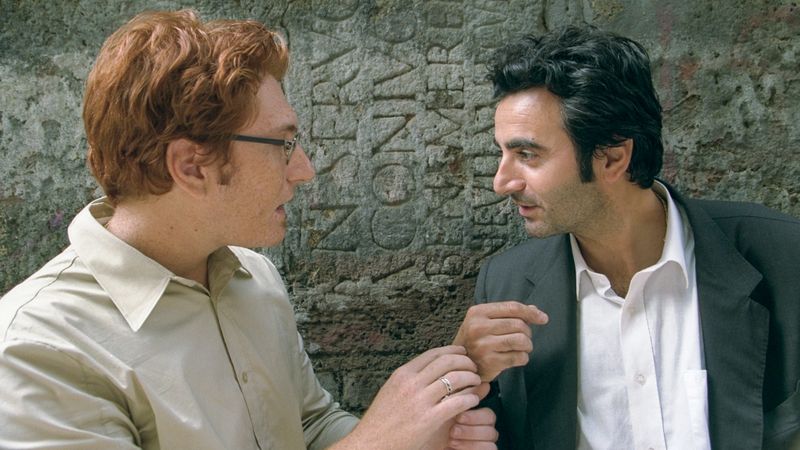Traveling as an American can be incredible, but sometimes we accidentally offend locals with thoughtless comments. After visiting 70 countries, I’ve learned that certain phrases can instantly mark you as an inconsiderate tourist. These verbal mistakes can turn friendly encounters into awkward situations and close doors to authentic cultural experiences.
1. “Why Don’t You Speak English?”

Nothing screams entitled tourist louder than demanding English in someone else’s country. Many locals do speak English but choose their native language first, which is completely normal and expected.
This question immediately creates tension and suggests you think English should be universal. Most people appreciate when visitors make an effort, even if it’s just basic phrases.
Instead, learn simple greetings like “Do you speak English?” in the local language. Even attempting “Habla inglés?” in Spanish or “Parlez-vous anglais?” in French shows respect and often gets you much better responses from locals.
2. “This Would Never Fly in America!”

Comparing everything unfavorably to American standards makes you sound incredibly condescending. Whether it’s different business hours, customer service styles, or cultural practices, this phrase dismisses entire ways of life.
Local customs developed for good reasons, often rooted in centuries of tradition and practical considerations. What seems strange to you might be perfectly logical in that cultural context.
Replace criticism with curiosity by asking “How does this work here?” with genuine interest. This approach opens conversations instead of shutting them down, and you might learn something fascinating about why things operate differently.
3. “Can I Get a Doggy Bag?”

Taking leftovers home is standard practice in America, but many European and Asian cultures view it quite differently. In France, asking for a doggy bag can seem like you’re questioning the chef’s portion sizes.
Some cultures believe taking food home suggests the restaurant served too much, which reflects poorly on their hospitality. Others see it as wasteful behavior or simply don’t have systems in place for takeaway containers.
Order smaller portions if you’re unsure about size, or ask discreetly: “Is it possible to take this with me?” This phrasing shows awareness that it might not be customary while still making your request politely.
4. “You Guys Have Real Coffee, Right?”

Coffee culture varies dramatically worldwide, and suggesting their version isn’t “real” is deeply insulting. Imagine saying this in Italy, where espresso culture is practically sacred, or in Ethiopia, where coffee originated.
Each country has developed unique coffee traditions over generations. Turkish coffee, Vietnamese ca phe sua da, and Italian espresso are all authentic expressions of coffee culture, not inferior versions of American coffee.
Show genuine interest by asking “What’s your most popular coffee drink?” This demonstrates respect for local preferences and often leads to discovering amazing new flavors you’d never experience with a dismissive attitude toward their coffee traditions.
5. “We’re Not Tipping—Service Is Included, Right?”

Tipping customs vary globally, but assuming you can skip it entirely in tipping cultures is problematic. Even when service charges are included, servers in countries like the United States, Canada, and parts of the Middle East still depend on tips.
Research tipping expectations before you travel. In some places, no tip is expected, while others require 15-20% regardless of service charges. Getting this wrong can seriously impact someone’s income.
When in doubt, tip at least 10% in cultures where it’s customary. A few extra dollars might not mean much to you, but it can make a real difference to service workers who often earn low base wages.
6. “This Isn’t Like the [Movie/TV Show] Version!”

Hollywood rarely portrays other cultures accurately, so expressing disappointment that reality doesn’t match movies is incredibly tone-deaf. Real places are complex, with modern elements alongside traditional ones.
Movies often exaggerate stereotypes or show outdated versions of places. Expecting Japan to look like an anime or Ireland to match romantic comedies sets you up for disappointment while insulting locals.
Instead, ask “What’s something most tourists misunderstand about this place?” This question acknowledges that media representations might be wrong and shows you’re interested in authentic experiences rather than fantasy versions of their homeland.
7. “Why Is Everything So Small/Slow/Old?”

Criticizing infrastructure, pace of life, or architecture that locals cherish shows complete cultural insensitivity. Many Europeans love their historic buildings, and slower life paces often indicate better work-life balance.
What Americans might see as inefficient, locals might value as sustainable or traditional. Small spaces might be cozy, slow service might be thorough, and old buildings might be treasured heritage.
Turn criticism into curiosity by asking “What do you love most about living here?” This question helps you understand local perspectives and often reveals wonderful aspects of places you might have initially judged negatively.
8. “I’m Part [Your Heritage], So I Get It.”

Claiming cultural understanding based on distant ancestry often comes across as appropriative rather than connecting. Unless you’ve maintained strong cultural ties, saying you “get it” can feel presumptuous to people living that culture daily.
Many Americans have mixed heritage but lack deep cultural knowledge of their ancestors’ traditions. Locals can usually tell the difference between genuine cultural connection and superficial ancestral claims.
Express genuine interest instead: “I’d love to learn more about this tradition.” This shows humility and openness to learning rather than claiming expertise you don’t possess. People respond much better to curious learners than presumptuous relatives.
9. “Can You Just Put It on My Tab?”

Tab systems are primarily American and British concepts. Most countries operate on pay-per-round or pay-immediately systems, especially in bars and casual restaurants. Assuming tabs exist everywhere shows cultural tunnel vision.
Many establishments prefer immediate payment to avoid tracking multiple orders and potential payment issues. Some cultures view running tabs as creating uncomfortable debt relationships between customers and servers.
Always ask about payment preferences: “Do you prefer payment after each order or at the end?” This shows awareness that systems differ and helps you adapt to local customs while avoiding awkward payment situations.
10. “America Does This Better.”

Perhaps the fastest way to alienate people anywhere is declaring American superiority. Even if you genuinely believe something works better back home, saying so directly is incredibly rude and dismissive.
Every country has strengths and weaknesses. What works in America might not suit other cultures, climates, or economic situations. Blanket superiority statements ignore complex reasons behind different approaches.
Replace arrogance with curiosity: “How do you handle this here? It’s different from back home.” This acknowledges differences without judgment and often leads to interesting discussions about why various approaches developed in different places.



